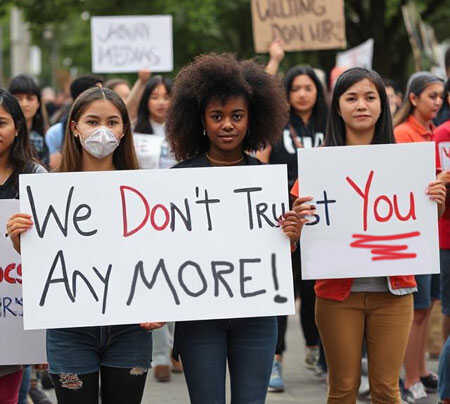
As media brandished their fake news recently, they failed to consider the long-lasting impact on the well-being of the youth. In an era dominated by instant information and overwhelming media saturation, America’s youth is facing a crisis of trust not only in institutions but in truth itself.
The latest Harvard Kennedy School Youth Poll paints a stark picture: young Americans are increasingly skeptical, disoriented, and disengaged from the government that claims to represent them. And it’s no mystery why.
For a generation that grew up amid the chaos of the COVID-19 pandemic, the turbulence continued even after the lockdowns ended. From rising inflation to housing unaffordability, from mounting student debt to economic precarity, the world they inherited feels more like a trap than a promise. But what’s made things worse and much more confusing is the modern media machine and how they exacerbated and even exaggerated issues and false characterizations for their own political gain.
Media mistrust and the fog of disinformation are thick in the minds of the youth because a once-trusted source fabricated such a depth of negative news about the government and political figures, leaving the youth willing to walk away from the pain.
The rise of social media and 24/7 news cycles has created a paradox: access to more information than ever, yet greater confusion, especially when blogs, podcasts, and social networks have proven to be more truthful than the dinosaur legacy media outlets. Once seen as the stewards of truth, they are now often viewed as biased, manipulative, and profit-driven. Sensationalized headlines, cherry-picked narratives, and blatantly false reporting have all contributed to a deep erosion of credibility.
Poisonous misinformation and disinformation don’t just come from obscure websites; they flow from the very platforms once trusted to inform the public.
For young people constantly bombarded with conflicting “facts,” separating truth from fiction has become an exhausting chore. The result? Widespread cynicism. They’re blocking out not just the media, but the political messages piped through them, especially when they’re riddled with contradictions and hidden agendas.
DOGE exposed government waste and outright fraud that left many, not only youth, saying, ‘Why should we trust the government, and who can tell us the truth?” Surely not the legacy media.’
Couple this media-induced confusion with repeated revelations of government waste and fraud, and the situation becomes even more dire. Billion-dollar fraud scandals, unchecked government spending, and broken promises have not gone unnoticed. From COVID-era stimulus fraud to the misuse of taxpayer money in bloated defense budgets and failed social programs, young Americans are seeing through the veneer of “public service,” and what they see isn’t pretty.
The Harvard youth poll demonstrated a mirror to the malaise. The numbers don’t lie. The 2025 Harvard Youth Poll shows only 19% of young Americans trust the federal government to “do the right thing most or all the time.” Congress fares even worse, with just 18% support. The presidency (23%) and the Supreme Court (29%) don’t escape unscathed either. This is a generation that simply does not believe its government has its back.
Support for the Democratic Party, once the darling of Gen Z, has collapsed, plunging from 42% in 2017 to a meager 23% in 2025. Republicans don’t fare much better. Even former President Trump, despite making minor gains among young Black voters, remains controversial among young and impressionable voters.
The implications are massive. The issue isn’t just political apathy; it’s legacy media-political burnout. These young Americans aren’t disengaged because they don’t care; they’re disengaged because they don’t believe the system cares about them.
According to Jordan Schwartz, student chair of the Harvard Public Opinion Project, “This generation doesn’t expect politics to solve their problems.” That’s a damning indictment of a political system that’s supposed to be for the people.
And yet, all is not lost. The disillusionment we see today may be a prelude to transformation. Historically, generational distrust has preceded great movements of reform, innovation, and cultural change. But for that to happen, both the media and the government must acknowledge their roles in creating the current crisis.
If leaders want to earn back the trust of America’s youth, it won’t come through empty rhetoric or flashy social media campaigns. It will require accountability, transparency, and genuine efforts to reform broken systems. That means cracking down on corruption, addressing the economic concerns of young Americans head-on, and fostering a media landscape that values truth over clicks.
Final Word: The youth aren’t “disengaged.” They’re awake, and they’re not buying what the legacy media and government soothsayers are selling.
https://patriotcommandcenter.org/forum/truth-breakdown-youth-rejects-media-and-government



